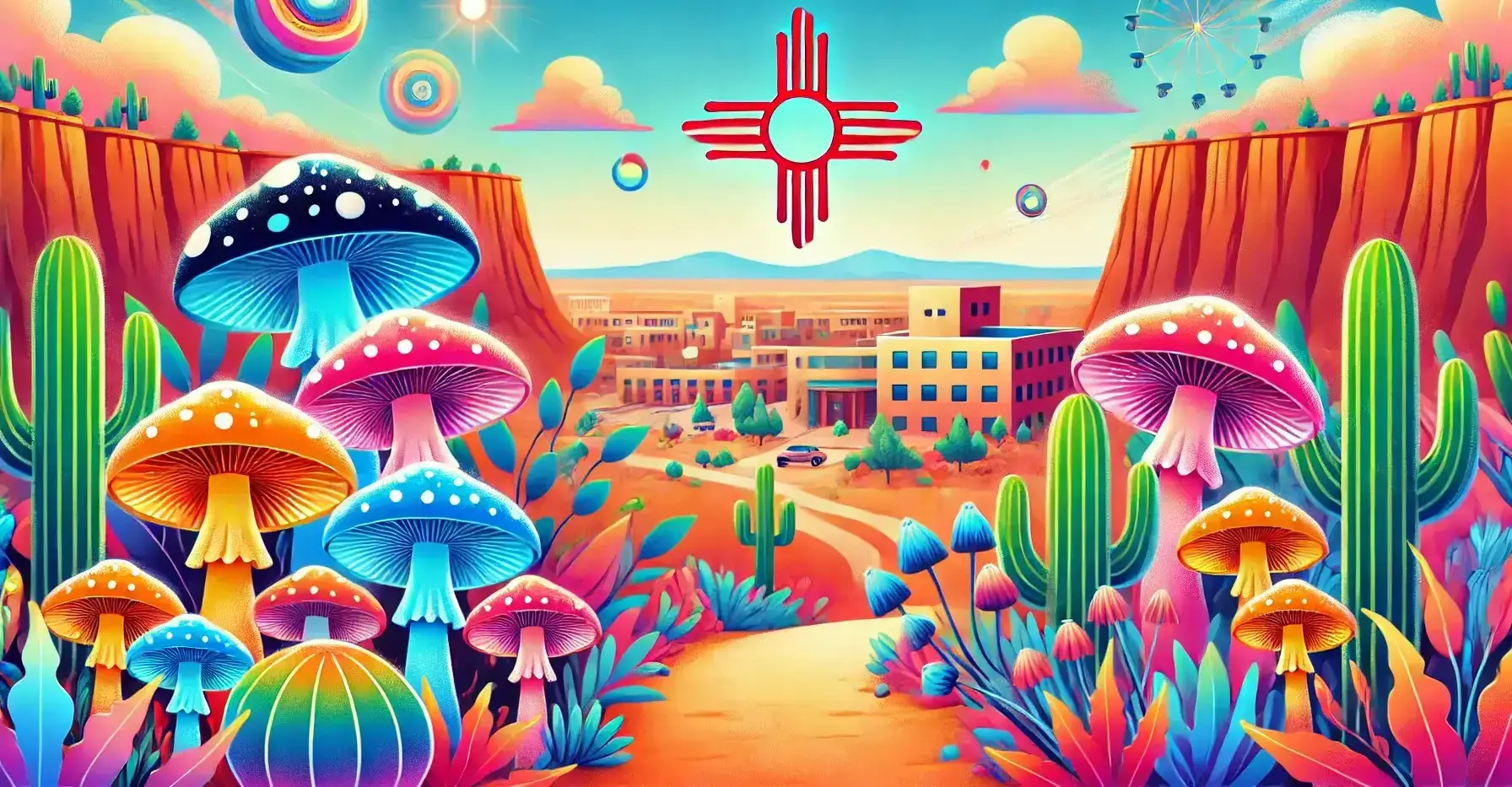TL;DR: New Mexico just became the first U.S. state to legalize psilocybin therapy through its legislature—not by public vote. This groundbreaking move could pave the way for a regulated, medical psychedelic treatment model nationwide. The program, backed by Senate Bill 219, focuses on depression, PTSD, substance use disorders, and end-of-life care—with a full clinical framework and legal protections baked in.
New Mexico Just Made History With the Medical Psilocybin Act—Here's What That Means
Something big just happened in the Land of Enchantment—and it wasn't aliens or hot air balloons. New Mexico is now the first U.S. state to legalize psilocybin-assisted therapy through legislation, not a ballot initiative. That's a pretty major shift in how we approach mental health, treatment-resistant depression, PTSD, and even end-of-life care.
So, what's actually in the new law? What does it mean for patients, healthcare providers, and anyone paying attention to the psychedelic space? Let's break it all down—with a few eyebrow-raisers and deep thoughts along the way.
Interested in exploring psilocybin mushrooms for research purposes? Our premium Golden Teacher spores are perfect for microscopy and educational study.
Shop Golden Teacher SporesWhat Is the Medical Psilocybin Act (SB 219)?
The Medical Psilocybin Act, or Senate Bill 219, is New Mexico's brand-new law that creates a regulated system for psilocybin-assisted therapy. It passed with flying colors—33–4 in the Senate and 56–9 in the House—and was signed into law by Governor Michelle Lujan Grisham in early 2025. The program is expected to launch by December 31, 2027.
This isn't just another bill—it's a legislative first in the U.S. Unlike Oregon and Colorado, where similar programs were approved by voters, New Mexico's plan came straight from lawmakers. That's a huge signal that psychedelic medicine is inching closer to mainstream acceptance.
Key Legislative Timeline
The bill's passage represents a significant milestone in U.S. psychedelic policy. With bipartisan support and comprehensive regulatory framework, SB 219 sets a precedent for other states considering similar legislation through their legislative bodies rather than ballot initiatives.
Who Can Access Psilocybin Therapy in New Mexico?
The law is pretty specific about who qualifies for this kind of psychedelic-assisted therapy. Right now, it's open to individuals diagnosed with major treatment-resistant depression, PTSD, substance use disorders, and those in end-of-life care.
But here's where it gets interesting: the Department of Health has the power to expand the list of qualifying conditions. That means as new research supports additional use cases—like anxiety, eating disorders, or chronic pain—those conditions can potentially be added. This program has room to grow, and that's by design.
Building your mycology knowledge? Explore our premium spore bundle featuring Enigma, APE, and Golden Teacher varieties for comprehensive research.
How Will This Actually Work?
This isn't just a "take a mushroom and see what happens" kind of deal. The law outlines a clear and clinical framework for psilocybin therapy. Patients will go through a structured three-part process: one preparation session with a licensed healthcare provider, one administration session (a.k.a. the journey itself), and one integration session to reflect and process afterward.
All of these sessions must take place in licensed, state-approved settings. So no at-home dosing, no fringe retreats in the desert. This is structured, supervised psychedelic medicine. Think grounded and guided, not wild and woo-woo.
The Three-Session Protocol
Preparation: Mental health assessment, education about the experience, and setting intentions.
Administration: Supervised psilocybin session in a licensed clinical setting.
Integration: Processing the experience and developing ongoing therapeutic strategies.
So… Real Mushrooms?
Yes—real mushrooms. The law specifically allows only naturally occurring psilocybin. No synthetic compounds. No lab-made analogs.
Licensed producers will be responsible for cultivating and processing psilocybin-containing mushrooms under strict regulations. It's a nod to traditional medicine practices, but also a logistical challenge. Growing mushrooms for consistent therapeutic use isn't as simple as tossing a spore syringe into a closet grow. That's where state oversight steps in.
For those interested in the cultivation side of mycology, understanding different strains and their characteristics is essential. Varieties like Jack Frost and Gandalf offer unique genetic profiles that researchers find fascinating for microscopy studies. If you're looking to buy mushroom spores online for research purposes, understanding these genetic differences is crucial.
The Advisory Board: Who's Steering the Ship?
Oversight of the program will come from a nine-member Medical Psilocybin Advisory Board. They'll set the standards for everything—from clinician training to dosage protocols.
What's refreshing here is the built-in diversity: the board must include an Indigenous representative, a mental health equity advocate, a veteran, and a representative from the state's healthcare authority. It's a thoughtful structure that reflects New Mexico's cultural richness and aims to build mental health equity into the foundation of the system.
What About Legal Protection?
Here's where things get smart. The law removes psilocybin from New Mexico's Controlled Substances Act—but only within the context of the medical program. That means patients, facilitators, cultivators, and processors working inside the legal framework are protected from prosecution.
But there's still a layer of accountability. Participants and providers will remain subject to standard medical malpractice laws. That ensures this new system is not only safe—but also ethical and professional.
Equity and Access: Two Dedicated Funds
To prevent this from becoming an exclusive wellness offering for the wealthy, the law creates two funding paths. The Treatment Equity Fund will help cover treatment costs for low-income patients, while the Research Fund will support scientific studies into psilocybin's safety and efficacy.
Originally, $4 million in public funding was proposed for both programs, but that line item was removed in committee. There's still a chance it could be revived through a separate bill, but either way, the intention is clear: access should be fair, and the science should keep evolving.
Breaking Down Barriers
The equity provisions in SB 219 represent a crucial step toward ensuring psilocybin therapy doesn't become another healthcare service available only to those who can afford it. The proposed funding mechanisms could serve as a model for other states developing similar programs.
A Quick Look Back: New Mexico's Psychedelic Shift
Governor Lujan Grisham is no stranger to bold drug policy. She signed off on recreational cannabis back in 2021 and has taken steps to ensure regulatory compliance in that space, even when it meant pushing back against her own party or federal pressure.
This new move? It's equally bold—but built on structure and caution. It shows a willingness to push the envelope while keeping both feet on the ground. It also positions New Mexico as a potential model for how other states could approach psychedelics through legislation, not just ballot measures.
When Will Psilocybin Therapy Be Available in New Mexico?
The Department of Health has until December 31, 2027, to build the system. That includes setting up licensing procedures for growers and clinics, developing training programs for healthcare providers, and establishing treatment protocols and infrastructure.
It's a long ramp, but when you're dealing with psychedelics in a clinical setting, slow and steady tends to beat fast and messy. This isn't about rushing a trend—it's about laying a solid foundation.
What's Next?
As New Mexico's psychedelic therapy program develops, here are a few things to keep your eye on:
How healthcare providers will be trained and licensed. Where and how psilocybin mushrooms will be cultivated and processed. Which additional mental health conditions could be added to the program. Whether funding for equity and research is reintroduced in a supplemental bill. And, of course, whether other states follow suit and pass similar legislation.
Final Thoughts: Mushrooms, Medicine, and a New Path Forward
New Mexico's Medical Psilocybin Act isn't just a milestone—it's a blueprint. One that blends caution with courage, science with tradition, and policy with purpose.
As more states explore psychedelic-assisted therapy, this law could very well be the model they follow.
And for all the mushroom nerds, therapists, policy watchers, or curious humans out there—stay tuned. The psychedelic space just got a major upgrade in the Southwest. To understand the legal landscape around psilocybin spores in your state, check out our psilocybin spore legality guide.
Oh, and of course—yes, we proudly ship to New Mexico. 😉
Ready to dive deeper into mycology research? Whether you're studying spore morphology or exploring genetic diversity, our complete product collection has everything you need for serious scientific study.
Explore Our Research CollectionAdditional Resources
- Read the full Senate Bill 219 text on the New Mexico Legislature website
- Follow developments in psychedelic therapy research and policy
- Explore our Golden Teacher and Jack Frost spore varieties for microscopy research
- Stay updated on psilocybin legalization efforts in other states
- Learn about the therapeutic potential of psilocybin through peer-reviewed research



